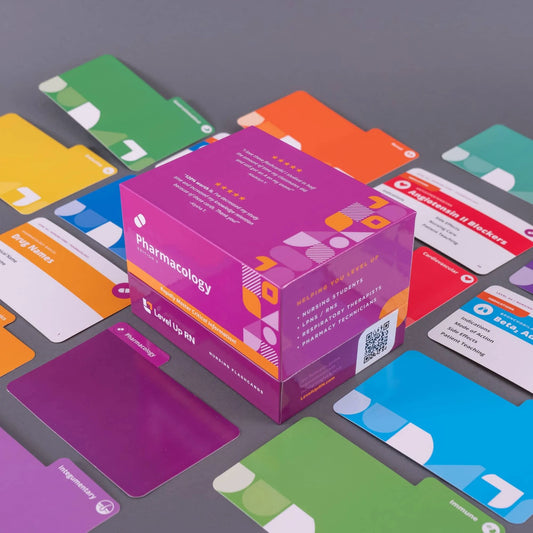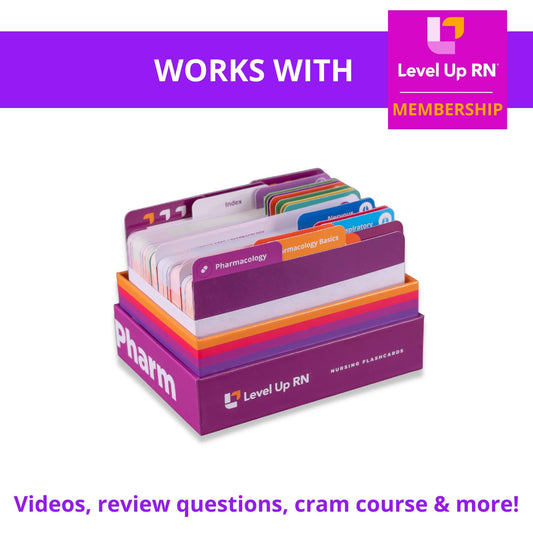Pharmacology, part 1: Introduction and General Study Tips
Updated: Cathy ParkesIn this video, Cathy provides an introduction to her pharmacology series. She covers her best tips for studying Pharmacology, how to remember medications, and what juice to go with when you're in doubt!
Full Transcript: Pharmacology, part 1: Introduction and General Study Tips
Full Transcript: Pharmacology, part 1: Introduction and General Study Tips
Hi! My name is Cathy Parkes, and I am a registered nurse as well as a certified wound care nurse and a public health nurse, and this is the first video in my new pharmacology video series. In this video, I will be going over some general tips for studying pharmacology, and then, starting in my next video, I will get into specific medications. Now, as I go through this video series, I will be following along with my flashcards, edition 2.0, that are available on my website, leveluprn.com. You do not need to have these flashcards to follow along and get value out of this video series; however, I definitely recommend that you either buy flashcards or make your own because repetition is key when it comes to learning pharmacology.
So while you're studying the medications, I really recommend that you spend a couple hours over multiple days versus many hours over one day. Research just shows that you retain the information a lot better if you space it out like that versus doing a huge binge studying session. So take your flashcards with you everywhere. Take them on a walk. Take them to the kid pick-up line. Take them camping. You can pull them out in between classes. Really, the more time that you can spend with those flashcards and the more repetition you do, you'll just learn it better that way. So if you are following along with our flashcards, definitely pay special attention to the items that I have bolded and put in red because those items are going to be particularly important for you to know as a nursing student and as a nurse. Also included in the deck, and what I'll be sharing with all of our medications, are my silly tips or hints for remembering a medication class or a particular medication. Some of these tips are kind of PG-13, so if you're easily offended, then this deck, and probably this video series, may not be for you.
So before we get into specific medications, I want to offer some kind of general tips for doing well on pharmacology. So, first of all, you definitely want to know the generic names of medications. So on a test, you will always be given the generic name of a medication. In some cases, you may be given the brand name of a medication. And if it helps you to know the brand name in order to remember the generic name, that's great, but you have to know the generic name. So definitely know those. Many medications are not safe during pregnancy, so I don't spend a lot of time knowing whether a medication is Category A, B, C, D, or whatever during pregnancy. I just assume that, like I said, most medications are not safe during pregnancy.
Also, for food interactions, when in doubt, go with grapefruit juice. So grapefruit juice interacts with a lot of different medications, so you really can't go wrong with grapefruit juice in most cases. There are other important food interactions that we will be going over as we go through this video series, as well, but definitely keep in mind grapefruit juice.
When it comes to medication administration, you always want to counsel your patient that they should not discontinue medications abruptly, and if they miss a dose, they shouldn't double down on a missed dose. So there are a few exceptions to that rule, such as birth control pills, but in general, it is not usually safe to double down on medications if a dose is missed.
For antibiotics, if your patient is going to be getting antibiotics, it's really important that we get that culture and do a culture and sensitivity prior to the patient starting those antibiotics. And when they start the antibiotics, we want to make sure they complete the full course of antibiotics. So that's going to be really important to know. So get that culture first; then, they can start their round of antibiotics while we wait for the results.
Also, when it comes to extended-release capsules, we do not want our patient to chew and we should not crush those medications if they're extended-release. When you are asked for a common side effect for a medication, you should probably go for something such as a headache or GI upset, and not something serious such as urinary retention or seizures. For many classes of medications, it's kind of intuitive to figure out what some of the side effects may be. So if a particular medication does its job too well then we could end up with adverse side effects. For example, if a patient is taking blood pressure medications and it does its job too well, we can end up with hypotension. If a patient is taking a diabetic medication and it does its job too well, we can end up with hypoglycemia. If the patient's taking an anticoagulant and it thins the blood too much, then we can end up with bleeding. So that's a good way to figure out what a key side effect could be of a medication. If you think about if the medication does its job too well, what will you end up with? So in my next video, I will get into specific medications in the respiratory system. Because as you know, as a nursing student or a nurse, airway and breathing is our top priority. So that's why we're starting with the respiratory system. So I hope this video series helps you a lot. Be sure to share a link to our channel with your classmates or friends who are in nursing school. Also, if you have additional tips or suggestions for remembering drug names or drug details, definitely leave those in the comments so that everybody can benefit from that information. And then lastly, I just ask that you like and you subscribe to our channel. And I wish you the best of luck with school. And I can't wait to share all of these medications with you and help you learn pharmacology so that you can ace your exam and be a safe and effective nurse.


